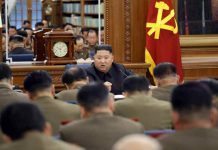North Korea has once again shown the duality of its strategy toward the South. First, Pyongyang confirmed on the 24th that members of the National Assembly Foreign Affairs and Unification Committee would be granted access to the Kaesong Industrial Complex (KIC) at the end of this month. Then, it also made the shock announcement that six South Koreans would be repatriated via Panmunjeom.
Given that both steps came in the aftermath of a spate of loud condemnation of the South and a consistently negative approach toward negotiations on remaining KIC issues concerning passage, communications and customs, it would have been logical for the North to refuse visiting rights to the National Assembly delegation. Equally, now did not appear to be a conducive moment for the release of South Korean detainees, no matter how undesirable their presence in North Korea may have been for Pyongyang.
On the one hand, North Korea’s abrupt shift could be seen as “a conciliatory message.” On the other, however, history suggests an attempt to incite confusion and conflict in South Korean politics and society.
By repatriating the six South Koreans, the North is able to emphasize its humanitarian side and promote the idea of South Korea as the lone roadblock to better relations, a situation that also works to China’s advantage. In this regard, the Ministry of Unification is reviewing North Korea’s wish to repatriate the six South Korean citizens through Panmunjeom rather than via a third country, given that it implies the goal of creating a propaganda spectacle.
Similarly, by allowing the National Assembly delegation to visit the KIC, Pyongyang has a chance to assert its stance on inter-Korean relations and the future of economic cooperation. The North will seize the opportunity to target some members of the opposition Democratic Party who have been openly critical of the Park administration’s North Korea policy to date.
Commenting on the situation, Professor Yoo Ho Yeol of Korea University told Daily NK, “North Korea has reached an impasse in dialogue with the United States, so it seems that they are utilizing a hard-then-soft strategy with South Korea.” He went on, “Though they have not given up their nuclear weapons, which in their eyes are of the utmost importance, they have once again embarked on a strategy able to foster a more conciliatory atmosphere.”
North Korea’s goal is to take the strategic lead in inter-Korean relations, an anonymous North Korea expert added. “Going forward, North Korea will keep trying to get South Korea to change its policy. The North had lost the upper hand in inter-Korean relations, and wants to take it back with this peaceful strategy.”
“The outside world believes that responsibility for the current poor state of inter-Korean relations is with the North, and the North wants to change this perception,” a second expert agreed. “This kind of image management is necessary if they want to attract foreign investment to their SEZs.” According to Oh Gyeong Seob of the Sejong Institute, “The North aims to lure foreign capital via this propaganda that says we’re striving to improve North-South relations.”




















